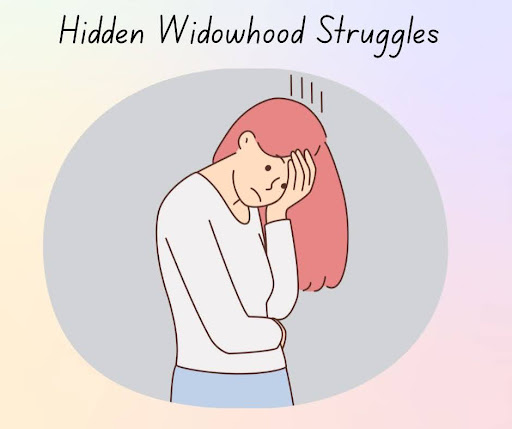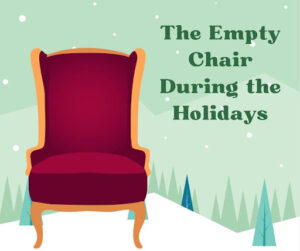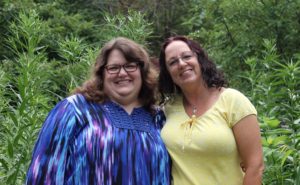Unfortunately, there is no handbook on how to be a widow. We lose our loved one and our world shatters. We have been thrust into a journey that we did not want and that we now must travel to get to the other side. There are theories and ideas about grief and its processes, but, as of yet, nobody has created a definitive guide on how we get through the grief of loss.This journey is not a checklist of items to be checked off as we travel. It winds and turns throughout its path.
In the beginning, people around us may bring us casseroles and other needed items for our survival as we begin this journey. They will offer words of encouragement and advice. However, those around us will seldom recognize or talk about the decisions that keep us up at night. Those decisions that come after the funeral or memorial. The ones we thought we would always share with our spouse and would never have to make on our own. Some of these are new to us, and some of them are additional losses that come with the loss of our spouse. These are often called secondary losses and represent those items, traditions, and other things that we have lost in addition to our loved one.
Let’s take a moment and talk about the other “things” we wrestle with as we travel our grief journey.
Finances
Suddenly, the household budget looks different and not just because there’s one less or no income. There are all of the bills, unexpected bills, dealing with insurance policies and estate matters. Finances can be a tough topic before widowhood, and can become overwhelming with the loss of your person. Some of us never paid the bills or dealt with the investments. Now, we get to deal with all the financial decisions and obligations on our own. We’re making solo decisions that impact our future and our children’s as well, while grieving.
The Home
The space you share with your spouse is yours together as a couple and family. It may be an apartment or home. Your type of residence doesn’t matter because every corner holds a memory. The kitchen with shared meals and holidays. The bedroom you shared can be the toughest. Teresa couldn’t sleep in their bed for weeks, choosing the couch or one of the kids. Jeni’s family and pets all piled into the big bed. There is no right or wrong in this instance. You need to do what feels right for you. That honey do list of projects he never got to finish are another loss and all these items are yours to finish or to decide on another option. Some widows choose to stay because they can’t bear to leave or it makes sense to stay. Other widows move because they can’t afford to stay or face all of the memories. Either way, it can be heartbreaking when considering what to do with your home and is another part of the struggles we face as widows.
Moving (Or Not Moving)
After losing a spouse, we may wonder about moving. Sometimes the pain of staying is too great, and moving feels like the only option. We may wonder if we should start fresh in a new place or stay where life feels familiar. Moving closer to family can be another question to ponder. Every option feels like leaving something or someone behind. Know that whatever you choose, take your time. Sage advice given to us both was to not make any major decisions, like moving, for at least a year.
What to Do With His Stuff
We all have stuff in our lives, and when we die, it is up to those we left behind to decide what to do with all the “stuff”. Nobody tells you how hard it will be to decide what you want to keep and what is ok to let go. To you, it is not just “stuff”. It is his scent on his clothes, his handwriting on that note. His presence is in the “stuff,” and it is hard to let go. Some of Teresa’s well-intentioned friends came over and cleaned her house. In the process, they washed all the clothes and removed his scent from everything. The rest of his items remained untouched and undisturbed for a very long time. For Jeni, moving his stuff was like getting rid of him all over again, and it was difficult to get rid of anything for a very long time. Just remember that what you keep and what you discard is ultimately up to you. You can take your time. Our advice is not to take it too fast. You may want to take a bit and allow the initial waves of grief to subside before you make “stuff” decisions. It will be there when you are ready to deal with it.
Family Dynamics
Let’s face it. You and your spouse were a unit in the family, and now that unit has changed. This loss not only affects you, but it also ripples through the family, and how each family deals with a loss is as different as each individual’s grief journey. Some families become closer as they grapple with the loss. For others, the loss reveals cracks and tension may surface regarding traditions, the “stuff,” and even how we choose to grieve. Well-meaning individuals may cross lines that make you feel uncomfortable and make it necessary for you to create boundaries in your time of grief. It can be painful to recognize that you have to set these boundaries in place, even with those you love and should be able to depend upon.
Grief Fog & Overload
When we lose a loved one, our body, mind, and soul are greatly impacted. It’s that first stage of grief you may have heard about, denial. To learn more about this and our experience, click here. When we sit and stare into space and lose time, forget our phone number or zip code, forget to pay bills, lose everyday items, it’s grief. It’s not a failure or something to feel bad about. It’s part of our grief. We feel overwhelmed by what was once simple tasks. That is grief clouding our thinking, turning everyday tasks into mountains.
Parenting Through Pain
When we’re a parent and we lose our spouse, we also have the children to consider, if they are young, the care and explaining it all. If they are older, they work through the grief together. That adds another layer of complexity to our grief. If you’re a mother, you can feel like you are grieving twice: once for your own loss and again for what your children are missing. We do our best to keep things together, maintain the household, and some sense of normalcy for them. That is an extra burden of parent grief when you are barely holding yourself up. Remember to take good care of yourself as you grieve with your children. You cannot grieve FOR your children; they must find their own way.
These are just a few of the many struggles that widows and widowers face. If any of these struggles feel familiar, you’re not alone. The widow’s journey is filled with the obvious struggles and those that are seemingly invisible to others. By acknowledging and naming them out loud, we can begin to process our losses and start to rebuild our lives.
You’re not weak for struggling.
You’re not broken for changing.
You’re human and you’re surviving and maybe even thriving.
We see you. And we’re walking this road with you.
We’d love to hear from you
What struggles have you found particularly challenging in your grief journey? Leave a comment or share this post. Someone else might need to know they’re not the only one feeling this way.
Peace & Blessings,
Teresa & Jeni
PS: For additional support, you can download our free copy of 10 Ways to Move Forward After Loss
The First Days: Coping with Life After Loss is a resource for the first days after a loss – available on Amazon in paperback.
My Journey as a Widow: A Widow’s First Journal is a follow-up journal for processing complex emotions and moving forward with hope. It is available in paperback on Amazon.
Follow us on Social Media:
Facebook: https://www.facebook.com/TornInHalfwidows/
LinkedIn: https://www.linkedin.com/company/torn-in-half/




